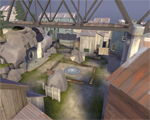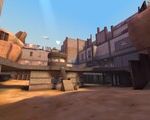Season 37
Low
Week 3
Round commencing: -
Schedule deadline: | Result deadline:
 Scheduled:
Scheduled:
Results submitted:
by skeej (UbeR powered by Gnoegaming.eu)
 The Official Dwayne Johnson TF2 Team
vs
The Official Dwayne Johnson TF2 Team
vs
 UbeR powered by Gnoegaming.eu
UbeR powered by Gnoegaming.eu
6 - 0
SteamID Screenshots: A
Players
| The Official Dwayne Johnson TF2 Team | (6) imectus, helipektiker, Derved, saltyy, Kumis, Pepy |
| UbeR powered by Gnoegaming.eu | (6) skeej, kKaltUu, quell, sno, MightyMe, EvoWarrior5 |
6 Comments
Leave a Reply
You must be logged in to post a comment.






 content rss
content rss
A default date has been set for this match by ETF2L.
The default date is: Thursday, 05 November 2020, 20:00
Please play this match on the appointed time and submit the results.
If the default date does not suit you, please contact your opponent and ask them to reschedule.
Prehistoric Ukraine, as part of the Pontic steppe, has played an important role in Eurasian cultural contacts, including the spread of the Chalcolithic, the Bronze Age, Indo-European expansion and the domestication of the horse.[1][2][3]
Part of Scythia in antiquity and settled by Getae, in the migration period, Ukraine is also the site of early Slavic expansion, and enters history proper with the establishment of the medieval state of Kievan Rus, which emerged as a powerful nation in the Middle Ages but disintegrated in the 12th century. After the middle of the 14th century, present-day Ukrainian territories came under the rule of three external powers:[4]
the Golden Horde
the Grand Duchy of Lithuania and the Kingdom of Poland – during the 15th century these lands came under the rule of the Crown of the Kingdom of Poland, then of the Polish–Lithuanian Commonwealth (from 1569)
the Crimean Khanate (from the 15th century)
After a 1648 rebellion of the Cossacks against the Polish–Lithuanian Commonwealth, Hetman Bohdan Khmelnytsky agreed to the Treaty of Pereyaslav in January 1654. The exact nature of the relationship established by this treaty between Cossack Hetmanate and Russia remains a matter of scholarly controversy.[5] The agreement precipitated the Russo-Polish War (1654–67) also called The War for Ukraine. In consequence, by the Eternal Peace Treaty, signed in 1686, the eastern portion of Ukraine (east of the Dnieper River) were to come under Russian rule[6], 146,000 rubles were to be paid to Poland as compensation for the loss of the Right Bank of Ukraine[7] and the parties agreed not to sign a separate treaty with the Ottoman Empire.[8] The treaty was strongly opposed in Poland and was not ratified by the Sejm (parliament of the Polish–Lithuanian Commonwealth) until 1710.[9][10] The legal legitimacy of its ratification has been disputed.[11] According to Jacek Staszewski, the treaty was not confirmed by a resolution of the Sejm until the Convocation Sejm (1764).[12]
After the Partitions of Poland (1772–1795) and the Russian conquest of the Crimean Khanate, the Russian Empire and Habsburg Austria were in control of all the territories that constitute present day Ukraine for a hundred years.
A chaotic period of warfare ensued after the Russian Revolutions of 1917. The internationally recognised Ukrainian People’s Republic emerged from its own civil war of 1917–1921. The Ukrainian–Soviet War (1917–1921) followed, in which the bolshevik Red Army established control in late 1919.[13] The Ukrainian Bolsheviks, who had defeated the national government in Kiev, established the Ukrainian Soviet Socialist Republic, which on 30 December 1922 became one of the founding republics of the Soviet Union. Initial Soviet policy on Ukrainian language and Ukrainian culture made Ukrainian the official language of administration and schools. Policy in the 1930s turned to russification. In 1932 and 1933, millions of people, mostly peasants, in Ukraine starved to death in a devastating famine, known as Holodomor. It is estimated by Encyclopædia Britannica that 6 to 8 million people died from hunger in the Soviet Union during this period, of whom 4 to 5 million were Ukrainians.[14] Nikita Khrushchev was appointed the head of the Ukrainian Communist Party in 1938.
After Nazi Germany and the Soviet Union invaded Poland in September 1939, the Ukrainian SSR’s territory expanded westward. Axis armies occupied Ukraine from 1941 to 1944. During World War II the Ukrainian Insurgent Army fought for Ukrainian independence against both Germany and the Soviet Union. In 1945 the Ukrainian SSR became one of the founding members of the United Nations.[15] After the death of Stalin (1953), Khrushchev as head of the Communist Party of Soviet Union enabled a Ukrainian revival. Nevertheless, political repressions against poets, historians and other intellectuals continued, as in all other parts of the USSR. In 1954 the republic expanded to the south with the transfer of the Crimea.
Ukraine became independent again when the Soviet Union dissolved in 1991. This started a period of transition to a market economy, in which Ukraine suffered an eight-year recession.[16] Subsequently, however, the economy experienced a high increase in GDP growth. Ukraine was caught up in the worldwide economic crisis in 2008 and the economy plunged. GDP fell 20% from spring 2008 to spring 2009, then leveled off.[17]
The prolonged Ukrainian crisis began on 21 November 2013, when then-president Viktor Yanukovych suspended preparations for the implementation of an association agreement with the European Union. This decision resulted in mass protests by pro-Europeans – events which became known as the “Euromaidan” or the “Revolution of dignity”. After months of such protests, the protesters ousted Yanukovych on 22 February 2014. Following his ousting, unrest enveloped the largely Russophone eastern and southern regions of Ukraine, from where Yanukovych had drawn most of his support. An invasion by Russia of the Ukrainian autonomous region of Crimea resulted in the annexation of Crimea by Russia on 18 March 2014. Subsequently, unrest in Donetsk and Luhansk oblasts of Ukraine evolved into a war between the Ukrainians and Russians with pro-russian Ukrainians. The Ukrainian crisis also very negatively influenced the Ukrainian economy.
Ain’t that something!
Y’all cool with moving the match to 21:15 CET?
Geert Wilders (Dutch: [ˈɣeːrt ˈʋɪldərs]; born 6 September 1963) is a Dutch businessman and politician. He has been Leader of the Party for Freedom (Partij voor de Vrijheid – PVV) since he founded it in 2006.[1][2] Wilders is the parliamentary leader of his party in the House of Representatives (Tweede Kamer). In the 2010 formation of the Rutte cabinet, a minority cabinet of VVD and CDA, he actively participated in the negotiations, resulting in a “tolerance agreement” (gedoogakkoord) between the PVV and these parties, but withdrew his support in April 2012, citing disagreements with the cabinet on proposed budget cuts.[3] Wilders is best known for his criticism of Islam and the EU;[4] his views have made him a controversial figure in the Netherlands and abroad, and since 2004 he has been protected at all times by armed bodyguards.[5]
sorry we cant play later than 20
pls remove status screen A
dwayne dudes pls upload screen for gullywash score, I don’t have it